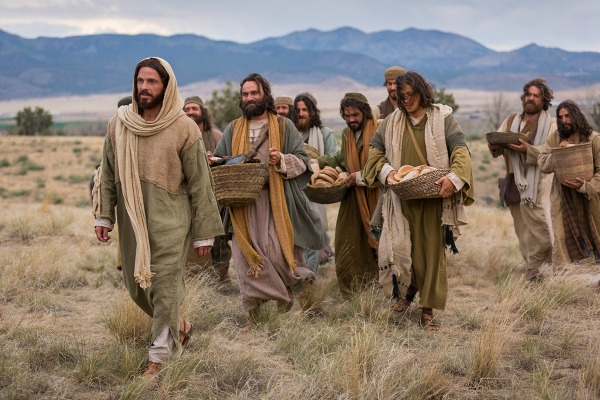Bless This Food That It Might Nourish And Strengthen Our Bodies…
How my efforts to be deliberate in my spiritual worship have led me to build and cultivate a stronger, more personal relationship with God.
We’ve all heard it before, at the dinner table before a fantastic home-cooked meal, we’ve said it on the go during a quick lunch, and we’ve awkwardly felt conflicted about it during the conclusion of a ward activity right before consuming an irresponsible amount of sugary treats.
“Bless this food that it might nourish and strengthen our bodies”
This phrase in some form or another seems to accompany nearly every LDS prayer over food. In fact, there have been multiple times in my life where a prayer has been repeated specifically because the “blessing on the food” was omitted. If you are anything like me, you’ve done your best to change up the wording in an effort to avoid heathenistic “vain repetitions” (Matthew 6:7). Below are some examples of my variations:
- Bless this food to the nourishment of our bodies…
- Bless this food that it might provide us the nourishment and strength we need…
- Bless this food that it can give us the strength and health we are in need of…
- Bless the food that it will be nourishing and strengthening to those who eat it…
Those that speak another language know this isn’t just an English phenomenon. In Russian, for example, the equivalent phrase is, “Благослави эту еду чтобы она пошла нам на пользу” (roughly translated, “Bless this food so it will benefit us”).
It took me over 30 years to ask the question: Why? Why have my meal prayers for 30 years felt so incomplete without some variation of this phrase? In fact, why do I bless my food at all? Was I ever commanded or encouraged to bless my food? Do I have faith that by uttering these words, the digestive and metabolic process will be different than it would have been otherwise?
Not having a clear answer to these questions, I began to search the scriptures, church resources and, of course, Google. After much digging, I only found a handful of references to this practice.
Christ Blesses the Loaves and Fishes

On 2 accounts, Christ performed a miracle of serving thousands of people with a very limited amount of food.
Matthew 14:19 — “And he commanded the multitude to sit down on the grass, and took the five loaves, and the two fishes, and looking up to heaven, he blessed, and brake, and gave the loaves to his disciples, and the disciples to the multitude.”
Matthew 15:36 — “And he took the seven loaves and the fishes, and gave thanks, and brake them, and gave to his disciples, and the disciples to the multitude.”
His blessing on the food in these accounts resulted in a miraculous increase. It’s interesting to note that in the first account, He blessed the food, and in the second He gave thanks.
Multiple Biblical scholars hypothesize that Christ was performing the b’rakhah, an ancient Jewish tradition to bless and praise God for his gift of bread, which could explain the difference in wording. In this practice, there is a short prayer preceding the meal, and a longer prayer after eating the meal (examples of praying and expressing thanks after the meal can be found in both the Bible and Book of Mormon: Deuteronomy 8:10 & Alma 8:22). In these prayers, the object of the blessing was God and other people, not the food.
Christ Blesses the Sacrament
On multiple accounts in both the Bible and Book of Mormon, Christ blessed bread and wine before He gave it to his disciples (Matthew 26:26, 3 Nephi 18:3-7, 20:3, & 26:13). He commanded his disciples to follow His example as he instituted the ordinance of the Sacrament (Moroni 4:3 & 5:2, D&C 20:77-79). This is an amazing example of how blessing food (in this case bread and wine that represent Christ’s flesh and blood) can magnify its purpose to sanctify those who worthily partake.
Other Miracles Related to Food
There are several other miraculous accounts of food being blessed to provide sustenance beyond its inherent ability. Elijah blessed the widow’s dwindling food supply to not run out until the drought in the land had ended (1 Kings 17). Nephi and Lehi prayed in faith and God used the Liahona to guide them to food as they traveled in the wilderness (1 Nephi 16). God miraculously blessed Moses and Israel with manna from heaven as they traveled in the wilderness (Exodus 16) and blessed their food and water to help them avoid sickness (Exodus 23:25).
After reading these scriptural accounts, I began to see a pattern. These accounts have certainly set a precedent for praying for God to bless food to perform beyond its natural ability, though the accounts are limited to extraordinary and miraculous circumstances. In the more “everyday” situations, prayers are directed more towards giving praise and gratitude to God for his bounteous gifts.
References in LDS Resources and Media
 I had to do quite a bit more digging to find references of blessing the food in official LDS resources. The only official source I could find where it actually states we should bless the food is in the Family Guidebook Manual. In it, it states:
I had to do quite a bit more digging to find references of blessing the food in official LDS resources. The only official source I could find where it actually states we should bless the food is in the Family Guidebook Manual. In it, it states:
“Parents should see that family members learn to thank God for their food and ask Him to bless it before they eat. Each person, including young children, should take a turn offering the blessing. Offering a prayer for a blessing on the food helps parents and children learn to be thankful to our Heavenly Father.”
In this example, the focus is primarily on gratitude and the term “blessing” refers to the prayer over the food in general, and not just the blessing of the food. A similar admonition came from Spencer W. Kimball to the Idaho Saints in 1976 after the Teton Dam Flood in which he simply states, “Never forget to bless the food.” It is likely that his definition here refers to the general importance of praying over food as mentioned in the guidebook above and not necessarily uttering the words “bless this food.”
The next closest source I could find that promotes blessing the food comes from Elder Dallin Oaks during an annual CES broadcast for seminary and institute teachers and a seminary instruction video in 2012.
“When I go to the table to eat I don’t take physical nourishment without asking the Lord to bless that food to nourish and strengthen my body… Similarly, I think when we study the scriptures we should bow our heads and pray … that the Lord will bless us that we will understand what we are reading.”
In this example, Elder Oaks affirms that this phrase is just as much a part of his prayer routine as it is for most Latter-day Saints. It’s also interesting that where the object of the blessing for food is the food itself, the object of the blessing for scriptures is the reader, not the scriptures themselves or the “spiritual nourishment” contained therein.
There are a few other, less authoritative examples that I found. One is a Q&A section in the July 1977 New Era Magazine answered by Carolyn Dunn Newman in which she asserted that blessing the food does in fact help the food go “beyond its regular nutritive power to bless us even more and give us added stamina.” Another is a story in the June 1999 Liahona Magazine where a woman describes an experience where her children blessing their food that was accidentally garnished with deadly poison caused the spirit to prompt her to intervene in the nick of time to save their lives.
And the most comical of the bunch is a comic in the “Extra Smile” portion of the March 2014 New Era in which someone remarks “These people have amazing faith. They bless Hawaiian Punch® and snickerdoodles to nourish and strengthen their bodies!”

Interestingly enough, I did find one reference from Bruce Porter from the First Quorum of the Seventy in a devotional given at BYU in 2012 where he cautioned against using vain repetitions in prayer, specifically citing the phrase “Please bless this food to nourish and strengthen my body.”
The Verdict
After my thorough study, I came to the conclusion that for me, I will reserve asking for a blessing on my food for the exceptional situations when I’m prompted to ask God for my food to do more than it would naturally on its own.
The rest of the time, I will focus on being grateful to God and praising Him for his goodness to me. I will ask him to bless me and others to have the strength and courage to serve others and do his will. As I’ve been doing this for the last few months, my recognition of God’s goodness in my life and my gratitude for his constant intervention has grown tremendously. I feel closer to Him because I feel more authentic in my communication with Him.
Blessings of Being Deliberate
I don’t share this story to try and convince you that it is vain to pray to bless the food. Trivial though it may seem, this was a very personal process and choice for me. I do share this story to illustrate an example of how striving to be deliberate and purposeful in my spiritual worship has led me to build and cultivate a stronger, more personal relationship with God. I encourage you to take inventory of the actions you take that comprise your spiritual worship routine, and identify areas where conforming to tradition for tradition’s sake may be keeping you from cultivating a stronger relationship with God.


